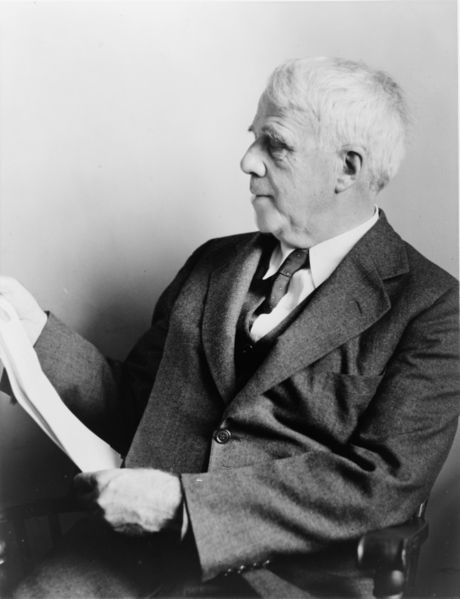At my good friend Daniel's request, I will be writing this post about Robert Frost, who is his favorite.
Mr. Frost was born in 1874 in San Francisco, California. His parents were both teachers, and his father also worked as a journalist. This may have been an inspiration for the young Frost, who knows. His father died when he was about 10 years old, and he & his family relocated to Massachusetts.
While much of Frost's poetry depicts rural life, he grew up primarily in the city. He attended Dartmouth University, where he was a member of a fraternity. After two years there, he left to return home to teach. He later went on to do liberal arts classes at Harvard. After publishing his first poem (which earned him $15), he got married.
Frost's life was frequently struck by tragedy. When his father died, his family was left with just $8. His mother died from cancer in 1900. He had to have both his sister and one of his daughter's committed to a mental hospital - mental illness ran pretty heavily in his family. He himself occasionally suffered from severe bouts of depression. Of his 6 children, only 2 outlived him. One of them committed suicide. And his wife died of heart failure after they were married for about 40 years. Pretty disheartening, but it only made him grow stronger as both a man and a writer. As he once said:
"I can sum up in three words everything I've learned about life -- it goes on."
After World War I, he purchased a farm in New Hampshire, where he spent much of his life and which inspired much of his poetry. The wall he described in his poem "Mending Wall" has been a favorite feature of his farm for many decades, as today this farmhouse is a museum known as The Frost Place.
At the age of 86, two years before the end of his life, Frost read one of his poems at the inauguration of President Kennedy. When he died, his tombstone was engraved with the epitaph:
"I had a lover's quarrel with the world."
A beautiful line from one of his poems.
So why is Frost such an important poet?
Because of his extremely realistic poetry. He wrote about rural life as it had never been written about in his day, and he did it superbly well. Not only that, but he often used these settings and images to portray the much deeper philosophy surrounding them, and used a lot of heavy metaphors. He was awarded 4 Pulitzer Prizes for his writing, and inspired millions of poets both young and old across America for decades. An inspiring man, all in all.
Here he is one of his most famous poems. If you've never read this, you must've attended high school in a crater on Mars. Its called "The Road Not Taken".
And sorry I could not travel both
And be one traveler, long I stood
And looked down one as far as I could
To where it bent in the undergrowth;
Then took the other, as just as fair,
And having perhaps the better claim,
Because it was grassy and wanted wear;
Though as for that the passing there
Had worn them really about the same,
And both that morning equally lay
In leaves no step had trodden black.
Oh, I kept the first for another day!
Yet knowing how way leads on to way,
I doubted if I should ever come back.
I shall be telling this with a sigh
Somewhere ages and ages hence:
Two roads diverged in a wood, and I—
I took the one less traveled by,
And that has made all the difference.
SJ


No comments:
Post a Comment